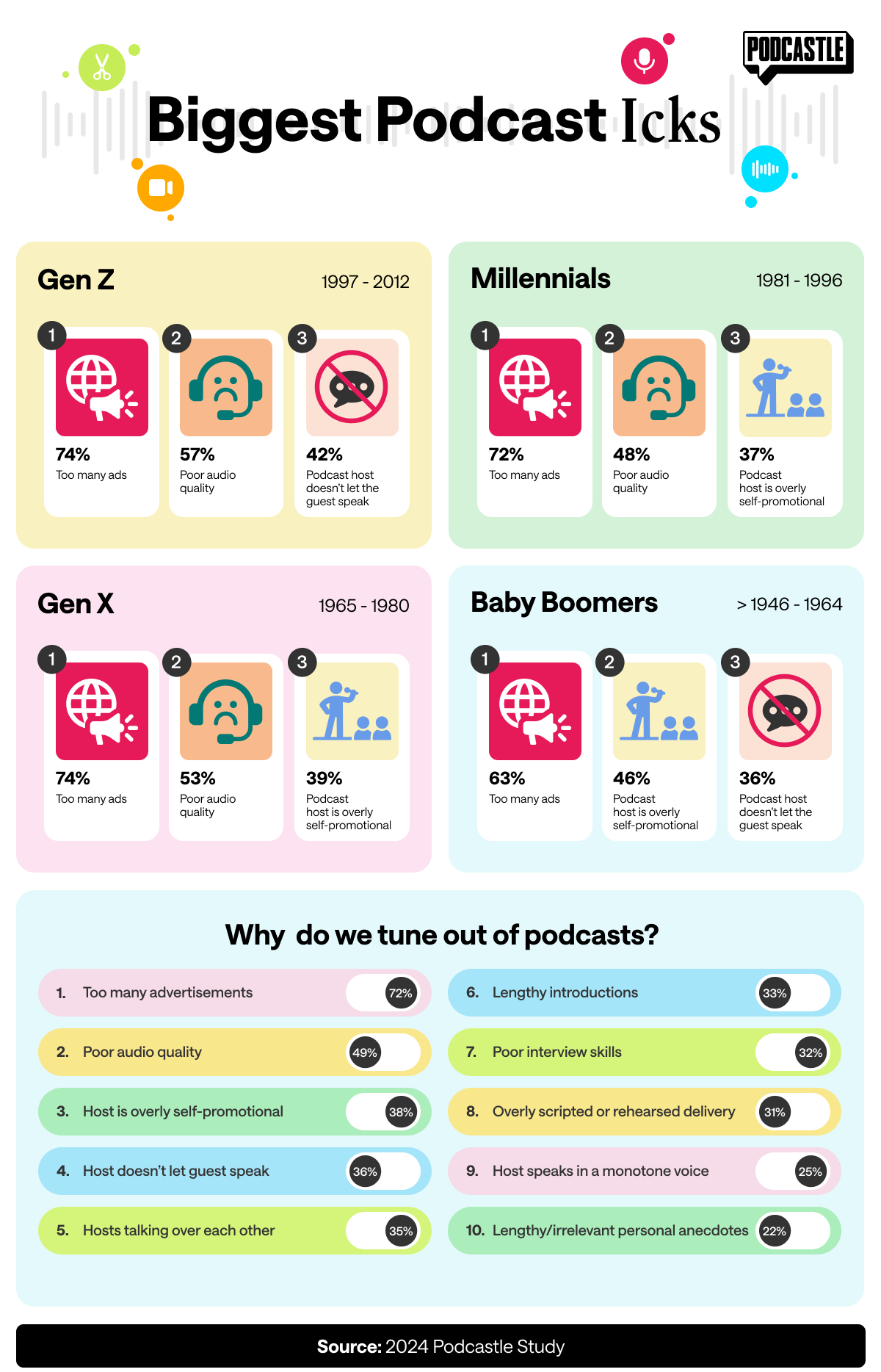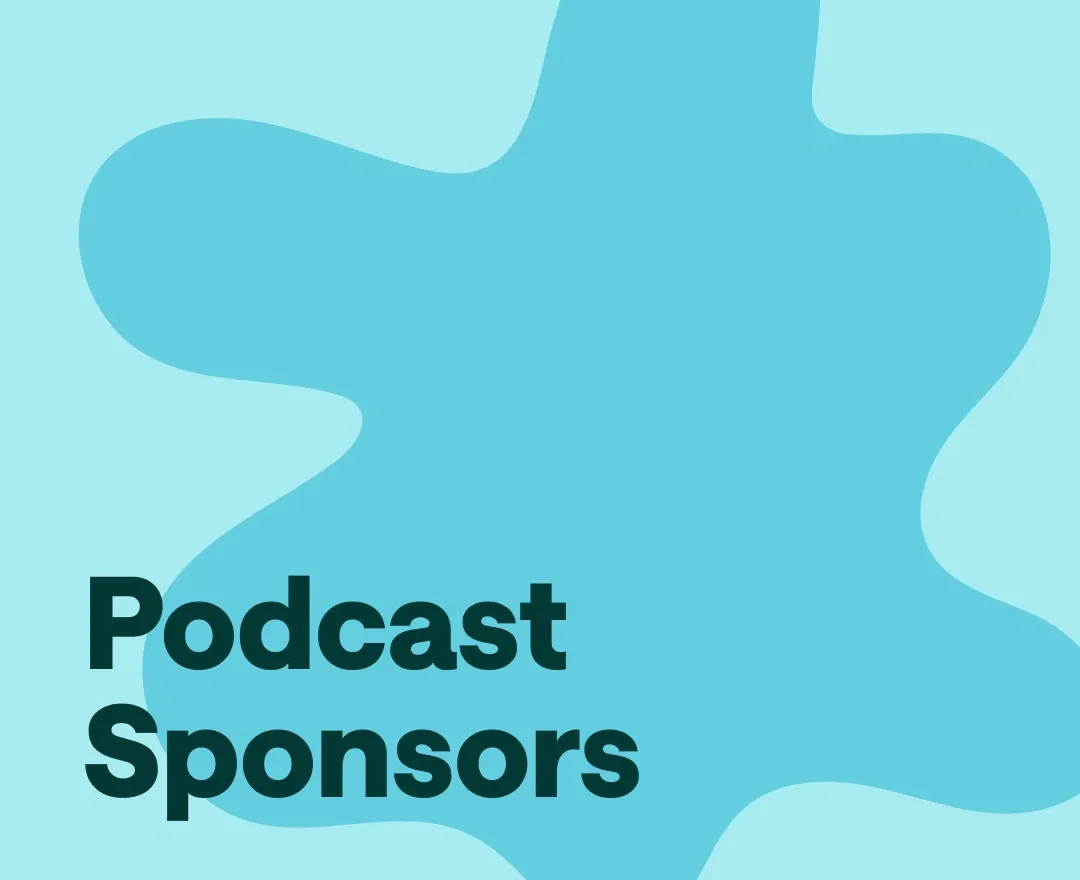At the time of writing, there are more than three million active podcasts reaching listeners across every niche — so it’s really no surprise brands are eager to sponsor engaging shows.
But as a podcaster, landing—and keeping—those sponsors requires more than just numbers. It’s about crafting a unique pitch and showing you understand your audience.
With sponsorship being a top monetization method, you’ll want to stay ahead, embracing trends and best practices. Once you understand what sponsors value, you can leverage AI-powered tools and strategies to boost discoverability and prove your podcast is the perfect partner.
Understanding the current podcast sponsorship market
Advertisers are doubling down on podcasts, recognizing just how effective they are for reaching dedicated, niche audiences. With ad spending expected to exceed $2 billion in 2024, brands are pouring in, drawn by how naturally host-read ads blend with content—making their messages feel like part of the conversation, not interruptions.
Shifts in podcast advertising
Advertisers are now relying more on data to place ads exactly where they’ll matter most, crafting messages that fit each listener’s unique tastes. With tools like dynamic ad insertion, ads can now adapt to fit individual preferences and habits, making the listening experience feel seamless.
Brands are also getting creative by weaving their podcast presence with social media and video content, building a consistent message that follows listeners across different platforms. It’s an exciting time for podcast advertising, as strategies become more refined and personal.
Emerging niches and untapped opportunities
Popular podcast topics like business and self-improvement still attract sponsors, but niche themes—mental health, tech innovations, sustainability—are opening doors to fresh brand partnerships. If your podcast taps into a specific interest, you might find emerging brands eager to connect with your audience.
Preparing your podcast for sponsorship
To attract sponsors, you need to ensure your podcast is ready. This involves refining your value proposition and optimizing your discoverability.
1) Define your Unique Value Proposition
Your sponsors will want to know what sets your podcast apart. Your value proposition is what sets your podcast apart.
Showcase metrics like listener retention, audience engagement, or niche authority. These qualities demonstrate why your podcast offers unique value, making it an appealing platform for sponsor investment. Make sure you can articulate why your podcast is a valuable platform for sponsors.
2) Optimize for discoverability and SEO
Ensure your podcast is easy to find by implementing SEO best practices. This includes optimizing episode titles and descriptions with relevant keywords such as "podcast sponsorship" and listing your show on all major directories.
Additionally, integrating tools like a QR code generator on your website or social platforms can make it easier for potential sponsors and listeners to find and engage with your podcast instantly.
3) Leverage dynamic ad insertion technology
Dynamic ad insertion lets sponsors adapt messages in real-time, enhancing ad relevance for listeners. It offers flexibility and value, helping sponsors reach targeted segments. Highlight this feature to show that your podcast stays updated with industry trends, benefiting both the audience and the advertiser.
Finding and approaching potential podcast sponsors
Identifying sponsors involves aligning your podcast’s audience with relevant brands. Use data tools to analyze listener demographics and showcase your podcast's unique fit. Craft targeted outreach by connecting episodes or themes to the sponsor's brand goals, emphasizing audience value and strategic alignment.
1) Match your audience with sponsors using data analytics
Sponsors want to reach an audience that aligns with their brand. By using audience analytics tools, you can demonstrate how your listeners' demographics, interests, and behaviors match the sponsor’s target audience.
2) Craft personalized outreach strategies
When reaching out to potential sponsors, skip generic pitches. Instead, personalize your outreach by referencing how your audience aligns with the sponsor's goals.
Mention past episodes where similar brands were mentioned or how your content complements their messaging. Likewise, you can also benefit from your sponsors in a roundabout way. By mentioning you in their press releases and publications, you can gain valuable backlinks and see an uptick in monthly traffic and listeners.
3) Use AI-powered sponsor-matching platforms
Podcasters can use platforms like Podcorn and Gumball to leverage the power of AI to match with sponsors that are a good fit based on two main criteria — audience metrics and advertiser goals.
While not every match will be a success, there’s a good chance that you’ll cut down on the time you spend identifying sponsors that would be a good fit and wading through the proposals in your inbox.
12 ways you can win over podcast sponsors
Your sponsorship proposal is your chance to showcase why a sponsor should partner with you. A media kit should include key audience data, including demographics, engagement rates, and unique listener metrics. Beyond downloads, highlight social media followers, email subscribers, and website traffic for a more comprehensive view.
1) Showcase engagement metrics beyond downloads
Brands increasingly care about engagement—listener reviews, social media engagement, and listener retention. Be sure to present these metrics in your proposal to paint a fuller picture of your podcast's impact.
2) Offer innovative sponsorship models
Consider offering more than just traditional ad spots. Creative models like co-created content, exclusive sponsor interviews, or experiential marketing opportunities (like live events) can make your proposal stand out.
3) Negotiating win-win sponsorship deals
A successful sponsorship deal is easy to spot — it’s set up in a way that both parties benefit and want the partnership to blossom into a long-term engagement. Before negotiations, understand the key performance indicators (KPIs) that are important to the sponsor—brand awareness, lead generation, or conversions. Tailor your offerings to align with these goals.
Sponsors value flexibility. Consider offering performance-based contracts where rates are partially determined by how well the sponsorship performs, which encourages long-term collaboration.
4) Using a tiered sponsorship system
To cater to sponsors of all sizes, consider offering tiered sponsorship packages. These can range from smaller sponsorships (like a single ad placement) to comprehensive packages that include podcast ads, social media mentions, and guest appearances.
5) Making sponsor messages feel natural
Maintaining listener trust is key to long-term success. This means integrating sponsor messages naturally. You’ll want to think strategically and always endeavor to place your ads in a way that doesn’t disrupt the listener’s experience — at least more than it has to. Approaches like mid-roll ads often work better than going pre-roll since they occur when the listener is more engaged with the content.
6) Leverage host-read ads effectively
Host-read ads are trusted by listeners, but they need to feel authentic. Sponsors are increasingly favoring hosts who can incorporate personal anecdotes or recommendations to make the ad feel genuine.
7) Balance sponsorship with editorial integrity
Too many ads can turn off listeners, so it’s crucial to strike a balance. Consider limiting ads to a specific number of seconds per episode and ensure that the content-to-ad ratio remains listener-friendly.

8) Proving your worth to sponsors
Proving ROI is essential for retaining sponsors long-term. To show sponsors the effectiveness of their campaigns, use advanced attribution models that track listener behavior post-ad exposure, such as sign-ups, purchases, or social media engagements.
Blockchain technology can offer transparency, allowing sponsors to see verifiable engagement metrics, reducing any ambiguity in reporting, and fostering trust.
Offer your sponsors access to real-time dashboards where they can monitor campaign performance. This gives them visibility into metrics like listener engagement and conversions, demonstrating your podcast's value.
9) Keeping sponsors coming back for more
A strong retention strategy is just as important as acquiring sponsors. Create a program focused on sponsor success. This could include regular check-ins, performance reviews, and strategy tweaks to ensure the partnership remains mutually beneficial.
10) Offer cross-platform value
Extend value beyond your podcast by offering sponsors exposure across your entire brand ecosystem, including newsletters, social media platforms, and exclusive podcast-related content.
11) Create exclusive sponsor events
Organizing events such as sponsor mastermind groups or behind-the-scenes tours can strengthen relationships and give sponsors additional reasons to stay engaged with your brand.
12) Use tech to your advantage
Use technology to streamline sponsor acquisition and retention. Implement CRM systems to manage relationships with sponsors, track communications, and monitor contract details. This ensures sponsors feel valued and that nothing slips through the cracks.
To boot, nowadays tools can even help you to determine the most engaging points to be used for inserting ads, ensuring maximum listener retention and ad effectiveness.
And, while still emerging, the metaverse presents opportunities for innovative sponsorships. Virtual events, product placements, or even metaverse-native podcasts could be the next big thing in podcast sponsorships.
Staying on the right side of sponsorship laws
Legal compliance is essential in the podcasting space. Ensure all ads are disclosed, following FTC guidelines to avoid fines or damaging listener trust.
Consider using smart contracts to automate sponsorship agreements, ensuring that terms are met and payments are made securely and transparently. Understanding what PDF/A is can also play a crucial role in this process, as it allows contracts to be preserved in a standardized, archivable format, adding an extra layer of security to your agreements.
Future-proofing your sponsorship strategy
The podcast industry is constantly evolving, and so should your strategy. We can't say for sure what the future holds, but there is room to consider the following three avenues:
- Adapt to Voice Search and Smart Speaker Advertising: As more people use voice search and smart speakers, tailor your ads for these platforms to tap into growing audiences.
- Prepare for AR/VR Integration: Podcasts will soon move beyond audio. Be ready to adapt to AR and VR podcast experiences, where immersive ads could play a major role.
- Explore Blockchain-Based Micropayments: Consider future-proof monetization models like blockchain-based micropayments, which could allow listeners to support your podcast directly, reducing reliance on sponsors.
Final Thoughts
To acquire and retain sponsors, focus on refining your value proposition, building personalized relationships, and demonstrating the tangible benefits of sponsorship. Podcasting is evolving, and to succeed among competitors, podcasters must continuously adapt and innovate.
Take your podcast to new heights with Podcastle's AI-powered content creation suite, and impress potential sponsors with engaging professional content. Start today and position your podcast as an irresistible opportunity for sponsors—ensuring success and sustainability well into the future.








